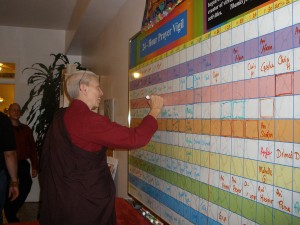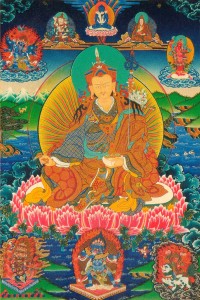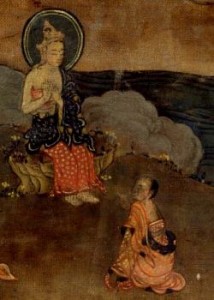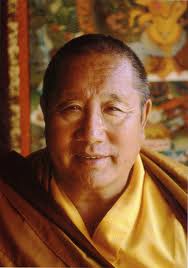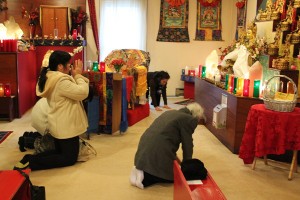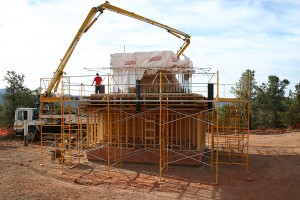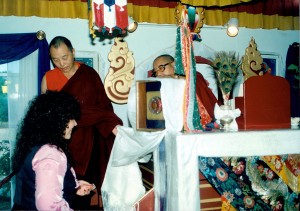The following is an excerpt from a teaching offered by Jetsunma Ahkon Lhamo during a “Good Heart Retreat”
I’m going to tell you this crazy vision I had. The reason why I feel okay telling you this crazy vision I had is because I’ve had a couple of others and they came true, oddly. They were so outrageous when I had them that I thought this would never happen; but I was hoping that it would. The first one I’m talking about is a case in point, and a perfect example.
Before I met my teacher and I was simply practicing meditation, I would go to work. On the way home, I would look for someplace quiet where I could meditate before I got home to my kids. As any parent knows, once you get home to your kids, meditation stops, or at least it’s stalled for a while. So before I got home to my kids, I wanted to do some practice and meditation. In the warm weather, it was easy. I could find a tree. Most people can find a tree. I noticed that when the weather was inclement or too cool, that in this amazing state of North Carolina where there are more churches than gas stations, I could not find one sanctuary, one holy place that still needed to be holy all week long. I could not find one place to go and sit and meditate. Apparently, whatever spiritual function was supposed to happen wasn’t supposed to happen during the middle of the week. What occurred to me is that this is a real difficulty and a real lack. So my vision, my hope, and my intention was to someday have a place of meditation that would be open 24 hours a day, seven days a week. So that no matter where people were, if they got up at 4:00 in the morning and really felt that this was their time to experience meditation, felt that calling, felt that need, that there would be some place that we could go that was peaceful away from our homes and our nests, and someplace that we could all call our own. So I had this idea. Wouldn’t it be great if I could make a place of meditation that’s open 24 hours a day, seven days a week, and always have prayer going on? Nah, it’ll never happen. Years later, here we are, and it has happened.
Now, I will tell you about my other vision. I had this wacky, crazy thought. I haven’t done the math for this, and I wish one of you cerebral types would do it for me. I’d love to have the math done. I’m thinking that we have a huge population in this country, an overwhelming amount of people. As I understand it, we also have an overwhelming amount of churches. Even the smallest towns have some kind of little church. I wouldn’t care whether it was a Christian church, whether it was a Catholic church, Protestant church, Jewish synagogue, Islamic mosque, anything, Hindu temple, Buddhist temple. If we could somehow, as spiritual organizations, consider ourselves to have one purpose and one mind, regardless of the differences in our religions, or the differences in our spiritual books. It seems to me that it would be possible, with all of the churches and temples that we have, if we put our differences aside and each church and each temple supported their community and ministered to their community in, let’s say, a ten block radius, ten mile radius. Could we work it out so that a spiritual center would help families or people in that area and support the community in such a way that in their area, there would be no hunger? Because the churches would take responsibility for this. Also, there would be no homeless that wanted a home. There would be friendship, counseling and whatever was needed available to families that are in trouble when a crisis arises; such as when there is alcoholism, drug abuse, child abuse or spousal abuse, or any mistreatment of people by one another. What if each and every church and synagogue, temple, whatever, took responsibility for a certain area? That’s where the math would come in. We’d have to figure out how we divide ourselves up.
What if it didn’t matter to each one of those churches and temples what religion the people around them were? For instance, the Presbyterians wouldn’t only minister to the Presbyterians in their area. The Jews wouldn’t only minister to the Jews in their area. The Catholics wouldn’t only minister to the Catholics in their area, and the Buddhists the same thing. I have this crazy, wacky dream. Wouldn’t it be wonderful if instead of this fixation that most churches have on getting as much money as they can, supposing we had another idea? Supposing we create a tremendous flow of energy and abundance through taking on this responsibility that we cannot afford to take on, and creating a flow in the community centered around the churches where if those people, if the people in their community really wish to give to charity, or really wish to help the poor, that would be a grass roots, right away, no-delay-way to do it. If you were giving some money to this certain church, then you would know that it was being used to care for your community. It simply wouldn’t matter what religion any of us were. The spirit of the thing would be spiritual people taking care of their community.
It would take a tremendous leap because the way it is now, we only want to help our own kind. This would not be a popular idea. Those that would go for it the least are the ones that could afford to do it the best. What if we as churches took the blame if somebody in our community was hungry? What if we finally could figure out where to point a finger when somebody in our community is not able to get by? What if the buck stopped here? Wouldn’t that be a revolutionary idea? Wouldn’t that be incredible?
I know what we’re all thinking. We’re all thinking, ‘This will never work.’ However, I didn’t know we were going to do this either. I hoped, I hoped that there would be a place where 24 hours a day, 7 days a week, we could pray for all sentient beings; but gee to really get people to do it… Wow, that’s something else. But my problem is that I am not at all practical or realistic. Those of you who manage my money know this. I just don’t get it. It’s all the same to me. And so I don’t get any reasons why this wouldn’t be possible. It’s a little like the bumblebee. Scientists say bumblebees can’t fly because they’re not aerodynamically correct. They should not be able to fly. But the good thing is that nobody told the bees because they’re still flying. So I was thinking: Wouldn’t it be great if we could be like those bees? What if we were too stupid to know that in our society in this day and age, it simply isn’t the done thing? What if we were simple-minded? What if we were so dumb we didn’t get the practical reasons why a spiritual community shouldn’t be responsible for the people around it? Wouldn’t that be really wacky, weird, ridiculous? But that’s what I think should happen. We could somehow make a gathering, or council, of religious people, or spiritual centers of all types, and agree to chip away at this. We could agree to divide the communities up. I really feel that it would be great if we did this to the best of our ability, and went into it with the same kind of energy we have when we fundraise for ourselves. We’re always fundraising. Turn on the TV. You always see them calling for more money. Well, what if we did that with the same energy, but instead of using it in some way to gratify ourselves, supposing we turned it around and spent it on the community?
Copyright © Jetsunma Ahkon Norbu Lhamo All rights reserved
